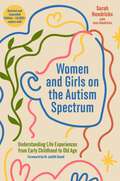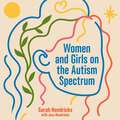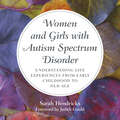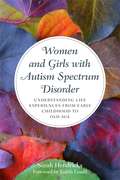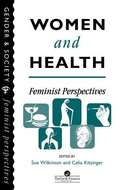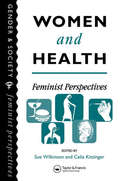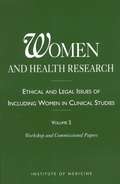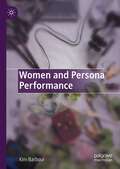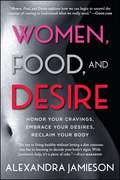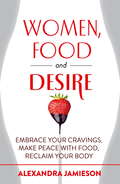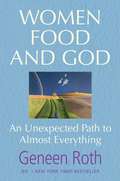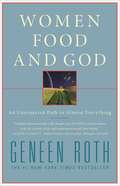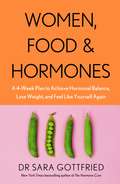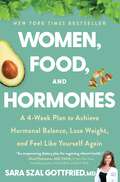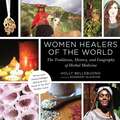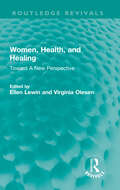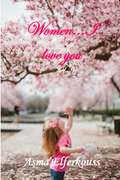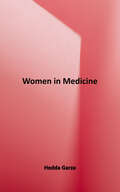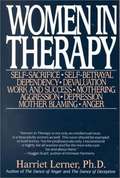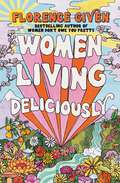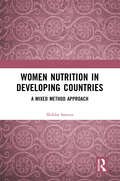- Table View
- List View
Women and Families: Feminist Reconstructions
by Kristine Baber Katherine AllenFamilies--often a source of satisfaction, growth, and fulfillment for women--can also be an arena of domination, abuse and pain. This volume uses a postmodern feminist perspective to elucidate women's myraid experiences in the family, providing an integrated analysis of critical aspects of intimate relationships, sexuality, childbearing decisions, caregiving, and work. Throughout, the book focuses on the nature of the choices women must make as thei attempt to meet their own needs while nurturing and sustaining their intimate and family relationships. Challenging the traditional definitions of the family, the authors incorporate feminist thinking and research from a variety of diciplines to illuminate both the commonalities and the differences in the experiences of diverse women. Action-oriented, the book stresses themes of economic autonomy, choice and equality, reproductive freedom, and education for critical awareness, and presents pragmatic recommendations for empowerment.
Women and Girls on the Autism Spectrum, Second Edition: Understanding Life Experiences from Early Childhood to Old Age
by Sarah Hendrickx Jess HendrickxThe difference that being female makes to the diagnosis, life and experiences of an autistic person is hugely significant. In this widely expanded second edition, Sarah Hendrickx combines the latest research with personal stories from girls and women on the autism spectrum to present a picture of their feelings, thoughts and experiences at each stage of their lives.Outlining the likely impact will be for autistic women and girls throughout their lifespan, Hendrickx surveys everything from diagnosis, childhood, education, adolescence, friendships and sexuality, to employment, pregnancy, parenting, and aging.With up-to-date content on masking, diagnosis later in life, and a new focus on trans and non-binary voices, as well as a deeper dive into specific health and wellbeing implications including menopause, PCOS, Hypermobility/Ehlers-Danlos, autistic burnout, and alexithymia, this is an invaluable companion for professionals, as well as a guiding light for autistic women to understand and interpret their own experience in context.
Women and Girls on the Autism Spectrum, Second Edition: Understanding Life Experiences from Early Childhood to Old Age
by Sarah Hendrickx Jess HendrickxComprehensive overview of autism in females with lived experience accounts and latest research.The difference that being female makes to the diagnosis, life and experiences of an autistic person is hugely significant. In this widely expanded second edition, Sarah Hendrickx combines the latest research with personal stories from girls and women on the autism spectrum to present a picture of their feelings, thoughts and experiences at each stage of their lives.Outlining the likely impact will be for autistic women and girls throughout their lifespan, Hendrickx surveys everything from diagnosis, childhood, education, adolescence, friendships and sexuality, to employment, pregnancy, parenting, and aging.With up-to-date content on masking, diagnosis later in life, and a new focus on trans and non-binary voices, as well as a deeper dive into specific health and wellbeing implications including menopause, PCOS, Hypermobility/Ehlers-Danlos, autistic burnout, and alexithymia, this is an invaluable companion for professionals, as well as a guiding light for women with autism to understand and interpret their own experience in context.(P)2024 Jessica Kingsley Publishers
Women and Girls with Autism Spectrum Disorder: Understanding Life Experiences from Early Childhood to Old Age
by Sarah HendrickxA unique look at women and girls with Autism Spectrum Disorder.The difference that being female makes to the diagnosis, life and experiences of a person with an Autism Spectrum Disorder (ASD) has largely gone unresearched and unreported until recently. In this audiobook Sarah Hendrickx has collected both academic research and personal stories about girls and women on the autism spectrum to present a picture of their feelings, thoughts and experiences at each stage of their lives.Outlining how autism presents differently and can hide itself in females and what the likely impact will be for them throughout their lifespan, the audiobook looks at how females with ASD experience diagnosis, childhood, education, adolescence, friendships, sexuality, employment, pregnancy and parenting, and aging. It will provide invaluable guidance for the professionals who support these girls and women and it will offer women with autism a guiding light in interpreting and understanding their own life experiences through the experiences of others.(P) 2021 Jessica Kingsley Publishers
Women and Girls with Autism Spectrum Disorder: Understanding Life Experiences from Early Childhood to Old Age
by Sarah Hendrickx Judith GouldThe difference that being female makes to the diagnosis, life and experiences of a person with an Autism Spectrum Disorder (ASD) has largely gone unresearched and unreported until recently. In this book Sarah Hendrickx has collected both academic research and personal stories about girls and women on the autism spectrum to present a picture of their feelings, thoughts and experiences at each stage of their lives. Outlining how autism presents differently and can hide itself in females and what the likely impact will be for them throughout their lifespan, the book looks at how females with ASD experience diagnosis, childhood, education, adolescence, friendships, sexuality, employment, pregnancy and parenting, and aging. It will provide invaluable guidance for the professionals who support these girls and women and it will offer women with autism a guiding light in interpreting and understanding their own life experiences through the experiences of others.
Women and Health: Feminist Perspectives
by Sue Wilkinson Celia KitzingerThis comprehensive volume provides a broad sample of contemporary British feminist work on women and health. It spans the disciplines of psychology, sociology, social policy, social anthropology and economics, and demonstrates the development of feminist theorizing and activism in these areas over the past decade. Topics include: global and national politics of women's health; the 'psychologization' of health: sexuality and AIDS; body image and pregnancy; reproductive technology; substance abuse; breast cancer; and the long-term health problems of women. Calling for a greater understanding of women and health, the contributors acknowledge the gender-based inequities of women's experiences and address the need for social and political change in order to improve the health and health care of women across the lifespan.
Women And Health: Feminist Perspectives
by Sue Wilkinson Celia Kitzingerthis comprehensive volume provides a broad sample of contemporary British feminist work on women and health. It spans the disciplines of psychology, sociology, social policy, social anthropology and economics, and demonstrates the development of feminist theorizing and activism in these areas over the past decade. Topics include: global and national politics of women's health; the 'psychologization' of health: sexuality and AIDS; body image and pregnancy; reproductive technology; substance abuse; breast cancer; and the long-term health problems of women. Calling for a greater understanding of women and health, the contributors acknowledge the gender-based inequities of women's experiences and address the need for social and political change in order to improve the health and health care of women across the lifespan.
Women And Health Research: Ethicaland Legal Issuesof Including Womenin Clinical Studies
by Committee on the Ethical Legal Issues Relating to the Inclusion of Women in Clinical StudiesThere is a growing perception that biomedical research has focused more on the health problems of men relative to those of women and that women have been denied access to advances in medical diagnosis and therapy as a result of being excluded from clinical studies.Women and Health Research, Volume 2, addresses issues connected with Women's Participation in clinical studies: ethical issues related to recruitment, retention, and the inclusion of pregnant women and other women of childbearing age; legal issues such as liability, compensation for injury, constitutional concerns, and federal regulations; and health consequences associated with exclusion or underrepresentation.The COMMISSIONED PAPERS focus on the research participation of women from specific racial and ethnic groups and on whether women have been underrepresented in biomedical research, based on a systematic survey of clinical studies reported in a prominent medical journal.
Women and Persona Performance
by Kim BarbourThis book works to unpack and explicate women’s personas. Drawing on global gender studies and feminist research, the author examines how ‘woman’ has been constructed socially, culturally, and politically throughout different historical periods and feminist movements. Case studies look at how women in different personal and professional settings construct, enact, and navigate their personas against a backdrop of shifting discourses on gender relations, continued patriarchal dominance, and western neoliberal capitalism. Chapters also delve into how women’s personas are constructed online through activism and community building. The author examines the diversity, flexibility, and slipperiness of the ways being a woman is experienced and strategically performed.This book will be useful for scholars and students in Gender Studies, Sociology, Psychology, and Media Studies.
Women, Food, and Desire
by Alexandra JamiesonA holistic health counselor and co-star of award-winning documentary Super Size Me explores women's cravings--for food, sleep, sex, movement, companionship, inspiration--and teaches them to listen to their bodies for a healthier, fuller life.Transformational health expert Alexandra Jamieson is a woman on a mission. Having overcome her own food addictions and the weight and health problems these habits caused, she learned something life-altering: when we listen to our cravings, they will lead us onto the path of deep healing. Since her own personal breakthrough more than a decade ago, Alexandra has dedicated her life to helping other women learn to listen to the wisdom of their cravings and make food their greatest ally as they step into their lives with authentic passion. In this powerfully feminine manifesto, Alexandra dares us to face our cravings head-on, to make the self-commitment to no longer hide out behind food, self-loathing, or the limiting expectations of others. With love, deep compassion, and fearless honesty, she calls upon all of us to boldly use food as a tool to cleanse ourselves of the nutritional, emotional, physical, and mental blocks that limit our ability to live full, meaningful, and joyful lives. In this book she'll show us how:· Our cravings are the gatekeepers of our deepest longings and desires· Transforming habits set us free· Detoxing unclutters our bodies and minds so we may engage in our lives with more power and authenticity· Embracing our sexual selves makes us more powerful· Trusting ourselves and surrounding ourselves with a nurturing community is essential for a vital, healthy, hot life
Women, Food and Desire: Embrace Your Cravings, Make Peace with Food, Reclaim Your Body
by Alexandra JamiesonTransformational health expert Alexandra Jamieson is a woman on a mission. Having overcome her own food addictions and the weight and health problems these habits caused, she learned something life-altering: when we listen to our cravings, they will lead us onto the path of deep healing. Since her own personal breakthrough more than a decade ago, Alexandra has dedicated her life to helping other women learn to listen to the wisdom of their cravings and make food their greatest ally as they step into their lives with authentic passion.In this powerfully feminine manifesto, Alexandra dares us to face our cravings head-on, to make the self-commitment to no longer hide out behind food, self-loathing or the limiting expectations of others. With love, deep compassion and fearless honesty, she calls upon all of us to boldly use food as a tool to cleanse ourselves of the nutritional, emotional, physical and mental blocks that limit our ability to live full, meaningful and joyful lives.In this book she'll show us how:· Our cravings are the gatekeepers of our deepest longings and desires· Transforming habits sets us free· Detoxing unclutters our bodies and minds so we may engage in our lives with more power and authenticity· Embracing our sexual selves makes us more powerful· Trusting ourselves and surrounding ourselves with a nurturing community is essential for a vital, healthy, hot lifeAlexandra Jamieson burst on to the scene when she co-starred in Super Size Me, the award-winning documentary by Morgan Spurlock. When the film wrapped, she wrote her first book, The Great American Detox Diet, which outlined the plan that first restored her, then Morgan Spurlock, back to health, and which revolutionised our thinking around using nutritional detox as a foundation for finding more balance in all areas of our lives.
Women Food and God: An Unexpected Path to Almost Everything
by Geneen RothMillions of us are locked into an unwinnable weight game, as our self-worth is shredded with every diet failure. Combine the utter inefficacy of dieting with the lack of spiritual nourishment and we have generations of mad, ravenous self-loathing women. So says Geneen Roth, in her life-changing new book, Women, Food and God. Since her 1991 bestseller, When Food Is Love, was published, Roth has taken the sum total of her experience and combined it with spirituality and psychology to explain women's true hunger. Roth's approach to eating is that it is the same as any addiction - an activity to avoid feeling emotions. From the first page, readers will be struck by the author's intelligence, humour and sensitivity, as she traces the path of overeating from its subtle beginnings through to its logical end. Whether the drug is booze or brownies, the problem is the same: opting out of life. She powerfully urges readers to pay attention to what they truly need - which cannot be found in a supermarket. She provides seven basic guidelines for eating (the most important is to never diet) and shares reassuring, practical advice that has helped thousands of women who have attended her highly successful seminars. Truly a thinking woman's guide to eating - and an anti-diet book - women everywhere will find insights and revelations on every page.
Women, Food and God: An Unexpected Path to Almost Everything
by Geneen RothThe bestselling author of "When Food Is Love" helps overeaters find the underlying reasons for using food as an emotional buffer. Roth also provides seven basic guidelines for eating and other therapeutic self-help tools.
Women, Food and Hormones: A 4-Week Plan to Achieve Hormonal Balance, Lose Weight and Feel Like Yourself Again
by Sara GottfriedTHE NEW YORK TIMES BESTSELLERNew York Times bestselling author Dr Sara Gottfried shares a new, female-friendly Keto diet that addresses women's unique hormonal needs, so readers can shed pounds and maintain the loss more easily.Most diet plans were created by men for men, but women's bodies don't work the same way. Popular programs can actually make it harder for women to lose weight, because they can wreak havoc on a woman's complex and delicate hormonal system. Dr Sara Gottfried has spent her career demystifying hormones and helping patients improve their health more broadly with personalised medicine.In Women, Food, and Hormones, Dr Gottfried presents a groundbreaking new plan that helps women balance their hormones so they can lose excess weight and feel better. Featuring hormonal detoxification combined with a ketogenic diet that is tailor-made for women, coupled with an intermittent fasting protocol and over 50 delicious and filling recipes, this book shares a fat-burning solution that gets results.
Women, Food, And Hormones: A 4-Week Plan to Achieve Hormonal Balance, Lose Weight, and Feel Like Yourself Again
by Sara GottfriedNew York Times best-selling author Dr. Sara Gottfried shares a new, female-friendly Keto diet that addresses women&’s unique hormonal needs, so readers can shed pounds and maintain the loss more easily. Most diet plans were created by men for men, but women&’s bodies don&’t work the same way. Popular programs can actually make it harder for women to lose weight, because they can wreak havoc on a woman&’s complex and delicate hormonal system. New York Times best-selling author Dr. Sara Gottfried has spent her career demystifying hormones and helping patients improve their health more broadly with personalized medicine. In Women, Food, and Hormones, Dr. Gottfried presents a groundbreaking new plan that helps women balance their hormones so they can lose excess weight and feel better. Featuring hormonal detoxification combined with a ketogenic diet that is tailor-made for women, coupled with an intermittent fasting protocol and over 50 delicious and filling recipes, this book shares a fat-burning solution that gets results.
Women Healers: Portraits of Herbalists, Physicians, and Midwives
by Elisabeth BrookeFrom antiquity to the present, women have been persecuted. In history, women midwives, healers and herbalists have been burned as witches, raped and tortured for their practices. More recently, women are threatened with sexual discrimination in the medical field in more covert ways. In this book, Elisabeth Brooke highlights women healers, herbalists, and midwives and shows them in both a historical sense, as well as a medical sense.
Women Healers and Physicians: Climbing a Long Hill
by Lilian R. FurstIn this provocative anthology of twelve essays, historians and literary scholars explore the work of women as healers and physicians. The essays range across centuries, nations, and cultures to focus on the ideological and practical obstacles women have faced in the world of medicine. Each examines the situation of women healers in a particular time and place through cases that are emblematic of larger issues and controversies in that period.
Women Healers of the World: The Traditions, History, and Geography of Herbal Medicine
by Rosemary Gladstar Holly BellebuonoA celebration of the healing traditions that made yoga, acupuncture, and aromatherapy popular.The recent trend toward holistic living has heightened our national fascination with herbal remedies and less conventional therapies such as acupuncture, yoga, aromatherapy, and ethnobotany. Now, this intimate and inspiring book opens up the world of herbal medicine to those interested in learning about the history of these techniques and approaches. Women Healers of the World shares with readers an extraordinary variety of healing plants from around the world that have inspired today's "alternative" medicine, as well as the stories, challenges, and triumphs of remarkable women healers from past and present-all of whom promote the use of medicinal herbs.Through this book, herbalist and author Holly Bellebuono aims to educate readers about sixteen plant-based world healing traditions and thirty women who have practiced them. Bellebuono also explores the geography, history, and medical heritage of twenty countries where these traditions originated.With thorough knowledge of the uses and effects of these healing traditions, readers can then move on to featured recipes for herbal remedies they can make in their home kitchens. Following Bellebuono's instructions, readers will produce remedies such as soothing lip balms, wound pastes, face masks, arthritis oils, relaxing bath salts, and revitalizing teas.
Women, Health, and Healing: Toward A New Perspective (Routledge Revivals)
by Ellen Lewin Virginia OlesenOriginally published in 1985, this collection of essays expands the understanding of both health itself and the ways in which women may experience their roles as consumers and providers of health care. The authors represent a number of disciplines – anthropology, sociology and political science – and examine issues of public concern on both sides of the Atlantic. Many important health questions are discussed, including the increasing use of high technology methods on obstetrical care, HRT, the treatment of frail elderly women, occupational health, health issues of sport and fitness, and health care systems of the UK, US and Canada as they relate to women in various social circumstances.
Women... I Love You: How do you understand family secrets and re-establish the truth?
by Asma ElferkoussLearning that there is a secret in the family after years and which influences the life of several people in the next generations is not easy... A fascinating story which aims to understand the past to bring back the truth...
Women in Medical Science Careers
by Jetty KahnTells the stories of the careers of five women who work in medical science including Gail Flaggs, Patricia Hoben, Margaret Hostetter, Janis Jackson, and Betty Jane Khreiss.
Women In Medicine (Women Then - Women Now Ser.)
by Hedda GarzaThe field of medicine has been an indicator of the status of women, as this book shows in recounting the story of women in medicine from ancient times to the present. By the nineteenth century, women were knocking on the doors of medical schools, demanding to be let in. In this book are numerous insights into the fascinating, long neglected history of women's relationship to medicine.
Women Living Deliciously
by Florence GivenIn this bold, illustrated guide, bestselling author and podcaster Florence Given encourages women to rediscover their joy, reject toxic wellness culture, and redefine feminism for themselves.Women Living Deliciously wants us to fall in love with our lives. It will help women uncover the sense of awe and wonder that has been buried by the layers of shame, perfectionism and self-objectification that get piled on us by the patriarchy. For too long we have internalized the belief that our bodies are things to be looked at—instead of lived in. That it&’s embarrassing to fully express ourselves. That we cannot trust the parts of ourselves that are so full of desire. This book will unpack the many barriers women face when trying to access joy so that they can discover the delicious life that&’s theirs for the taking. International-bestselling author Florence Given wants to restore your lust for life and your sense of agency, giving you the courage and permission to inch closer to the wildly expansive life that you FULLY deserve—not in the future, not when you&’re perfect, not when you&’re prettier—but right now.
Women Nutrition in Developing Countries: A Mixed Method Approach
by Shikha SaxenaThis book explores the historical perspective of food security, women’s access to food, malnutrition and obesity among women, and household food security to present an analysis of women’s nutrition in developing countries. It also includes a chapter detailing the history of slums – based on the narratives of the key informants. This chapter focuses on the interlink ages between the household food security variables and their temporal relationship with the nutritional status of women in slums of Ghaziabad. The subject matter of this book also covers: Food Security in an Urban Poor Context Socio-Ecological Perspective on Food Sufficiency Inequalities and Caste Discrimination Quest for Determinants of Household Food Security Print edition not for sale in South Asia (India, Sri Lanka, Nepal, Bangladesh, Pakistan or Bhutan)

